Formula E All-Electric Series Remains Ahead of the Curve
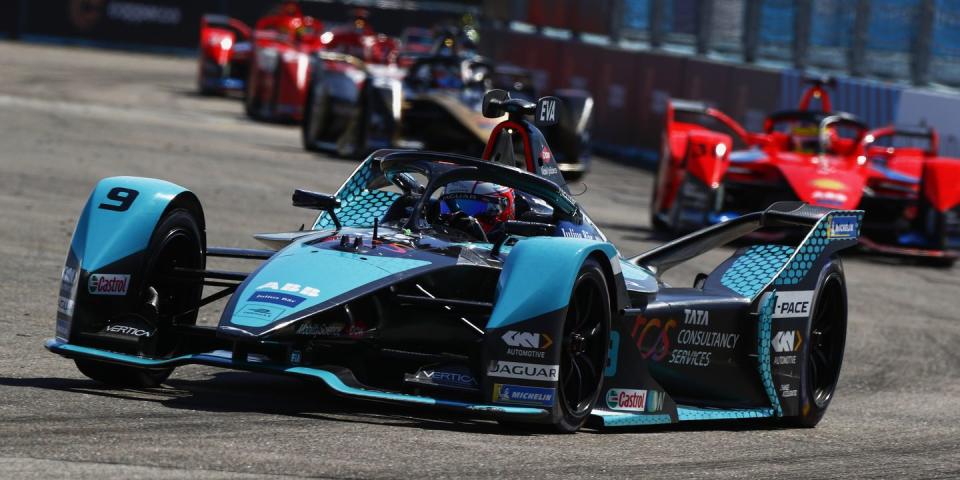
Formula E CEO Jamie Reigle has a pretty fresh way of looking at the all-electric open-wheel racing series as it powers through its eighth season.
If it ain't broke, make it better.
The ABB FIA Formula E World Championship comes to Brooklyn, N.Y., July 16-17. It will be the series' latest stop in the shadow of New York City and lone U.S. race on the schedule. Ask Reigle, and he'll tell you that the series is still hitting its marks while sticking to its principles.
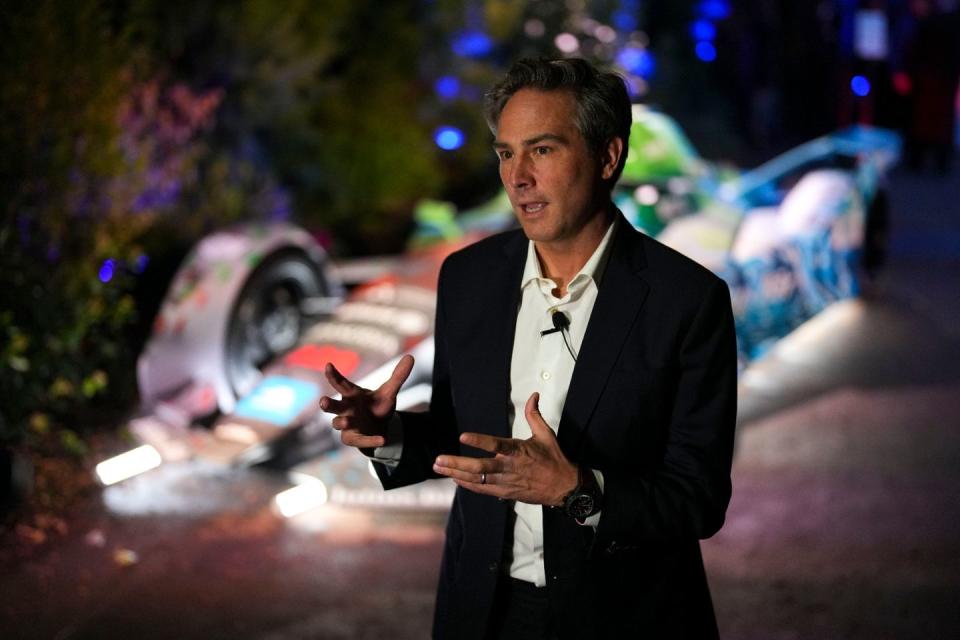
"The founding principle of the formula was to try to bring together the power of sports, the power of motorsport, with this important shift that is happening in technology and consumer perception around electric," Reigle said in an exclusive Autoweek interview. "We're unusual in sports and in motorsport, where we were founded with that sense of purpose, if you will, or desire to shift perceptions around electric mobility. That still plays through all the way to today and I think will continue to be relevant for us going forward."
Reigle has been CEO at Formula E since 2019. He had no way of knowing he'd be dealing as much with a pandemic as he would with a motorsports revolution of sorts during his first two years on electric racing's biggest hot seat.
Some might even call it racing's biggest petri dish.
"The last two years showed us, on the one hand, huge acceleration of some EV manufacturers, including Tesla with the Model 3, Porsche with the Taycan," Reigle said. "You've seen big, big leaps forward. On the other hand, others maybe are not moving as quickly. It's kind of focused our minds around the proposition for Formula E and we've really tried to refine what I call the sporting proposition."
Mixing Show with the Go
This season, and looking into the future, it's all about combining the show with the eco-friendly go for Formula E.
"The qualifying format, the racing, make sure that it's as exciting as possible," Reigle said. "For our technology road map, we've got our Gen 3 car coming next year. How do we make sure we have a leadership position?
"The Gen 2 was a four-year cycle, so it was really fresh when it came out in 2018. But, you know, candidly, it's ready for an upgrade. And then, it's about what I call the show. Like, what's the spectacle look like? What's the fan experience? Where are we racing? Are we showing up on the biggest stages?
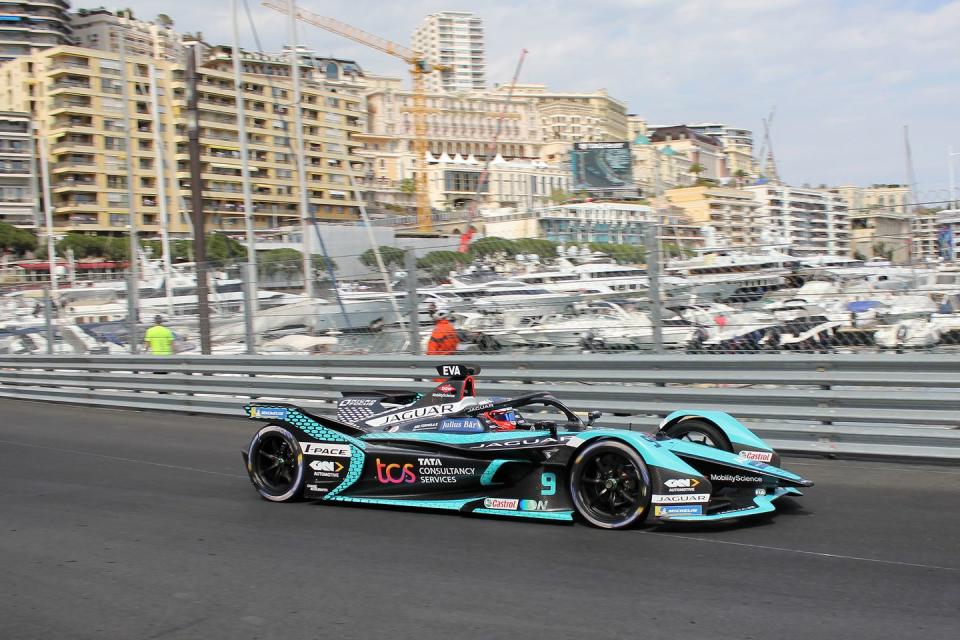
"We're excited, we've done Monaco for the last couple of years, we've just signed a five-year deal with them to continue. But we're also going indoor/outdoor in London in a few weeks, so we really think we're putting on a different kind of motorsport show, and that's something we're really proud of.
"Electric is the thing that courses through our veins. I think what we're really trying to refine is how do we make the sport really awesome and exciting for the fans."
Going from 'What?' to Wow
When Formula E hit the world stage for its maiden season in 2014-15, it featured nearly as much of a "what?" factor as it did a wow factor. There were those—and frankly, there are still those—who say "quiet" racing will never catch on. In the series' Gen 1 era, pit stops meant entire car swaps (yes, drivers would start the race in one car and end it in another) due to the limits of battery power.
Formula E now runs its entire 45-minutes-plus-one-lap race in the same car, on the same battery charge. Top-end speed is about 175 mph. Reigle promises that number will be closer to 200 next year with the Gen 4.
Eventually other racing series will also be full electric. When NASCAR, NHRA and IndyCar go full electric, will Formula E lose the biggest talking point that makes it different from other major racing formats? When, not if, that happens, will Formula E be able to survive in a sea of multiple all-electric racing series?
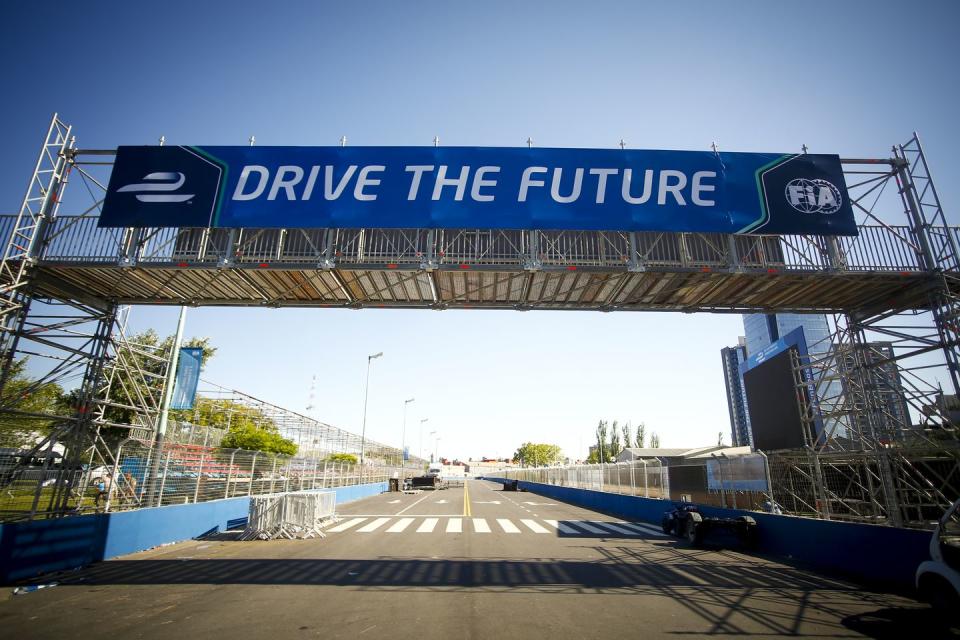
After all, if General Motors indeed hits its target of an all-electric fleet by 2035, it would seem only natural for the manufacturer to want to feature its electric models on its motorsports platforms. The bottom line adage in racing has always been, always will be, "Win on Sunday, Sell on Monday."
How much would GM pour into development of an internal-combustion engine for, say, NASCAR, if the company is no longer selling ICEs in the showroom? Racing on Sunday something you don't sell on Monday might not work in NASCAR for very long.
"Well, let's separate the automotive industry from racing just for a second," Reigle said. "I think there's a degree of inevitability that the world is going electric. The U.K. has banned petrol cars after 2030. The European Union has banned them after 2035. So that is happening.
"In the U.S., it's a little bit more about average emission outputs and not outright bans. But we've seen with the likes of GM saying, 'We'll be full electric by 2035.' That was a pretty momentous moment when General Motors came out and said that and made that commitment. I don't think they're doing that because of government regulation. They're just doing it because they think that's where people are going to want to be from a consumer perspective—they're going to want to buy cars that are electric."
Reigle is a student of the industry. He sees consumer and manufacturer wish lists already changing at an historically rapid clip.
"Look at what Tesla's done, and you've got Rivian shipping trucks now," he said. "Now you've got electric Hummers, you've got the Ford 150 Lightning. I mean, these are big, big moves—not just in small passenger cars, but trucks as well. So that's what's happening on the car-industry side.
"Then the question is, what does that mean for motorsport? I think there's no doubt that all of the series are facing pressure to be more sustainable and to have their propulsion—their powertrains—linked a little more to the direction of the auto industry.
We are the first sport to be net zero carbon since inception, but what does that mean? ♻️
Learn more about what our sustainability strategy entails and how we continue to reduce the environmental impacts of the championship!— ABB FIA Formula E World Championship (@FIAFormulaE) July 6, 2022
"Candidly, I don't think you'll see Formula 1 go full electric. First of all, we have an exclusive license from the FIA as an FIA World Championship. We're the only one that can be open-wheel single-seater electric. Formula 1 cannot do that.
"But they'll shift more power towards the electric component. They'll have higher degrees, higher power in the hybrid system. And you know, they're adopting e-fuels and things like that. We view that as a positive, because they're innovating and they're doing things that are going to be better for the environment."
New Electric Avenues?
While Formula E holds a trump card over F1 in terms of electric technology and its FIA exclusivity, the electric series could see its lane of racing get a little more crowded in the not-too-distant future.
Or maybe not.
"Do I see NASCAR going electric anytime soon? I don't see that," Reigle said. "They're talking about a hybrid, and that is designed to appeal to the manufacturers, for sure. But there are huge, huge fan bases who associate their product—whether it's Formula 1 or NASCAR, IndyCar—with shock and awe, noise, smells, etc.
"And so, I think it'd be pretty hard for them to go full electric, which is why we think we've got a good runway and a good opportunity."

Reigle clearly does not see an overnight switch from internal-combustion power—and all the sounds and smells that go with it—on the racing side anytime soon. Of course, it might not be the racing series' call.
"Just to be clear, I think there's no doubt that the race series are going to have to react to what the manufacturers want, but my point is that racing is a sport," Reigle said. "And obviously, the car companies in the case of NASCAR—Toyota, Chevy, and Ford—they're going to have a big say in terms of the direction of the championship.
"But NASCAR has got millions of people watching every race on TV, hundreds of thousands of people showing up at the tracks who want to hear that sound, right? So I just think they've got a kind of tricky balance to walk there. Who are you serving? Are you serving the fan or are you serving your manufacturers?
"Our challenge is different. We've got the technology that is the direction of where the world is going. We have to build a fan base. We've got sort of the inverse challenge of those other guys. They've got deep, deep fan bases, big histories that we're trying to build ourselves. We've got the technology road map. It's just gonna be interesting to see how it plays out.
"My personal view is we're all going to kind of happily coexist for a pretty long time."
No Sleep Till Brooklyn
The U.S. market has been an interesting, if not slightly uninspiring, one for Formula E. That first year of the series in 2014-15, Miami and Long Beach hosted events. Miami was a one-and-done, and Long Beach's race lasted just two years. Since Year 3 in 2016-17, Brooklyn has been Formula E's lone U.S. stop.
Brooklyn did not make the provisional 2023 Formula E schedule, as details still need to be worked out. Reigle, however, promises to race in a U.S. market that he calls "critical" to the series.
"Oh, it's absolutely critical," Reigle said. "Just to be clear, we have a super strong commitment to try to have not just one, but multiple races in North America. I mean, we have Mexico. We have New York. We've had a bit of a challenge with Vancouver, but we hope to bring that one back in 2024.
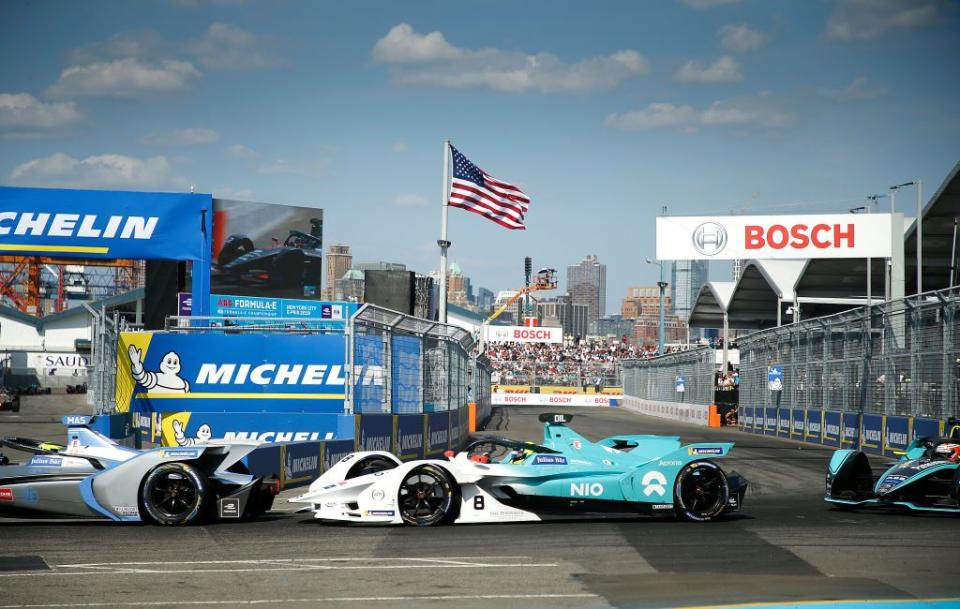
"We want to be active in North America. I was personally at Indy, at the end of May with (Formula E team owner) Michael Andretti and his team, and it's just a massive market with a big appreciation for motorsports. We're special in the sense that we've been able to do it in New York now for for five, six years, and we'd love to stay there.
"We've got a good venue in Brooklyn, but it's a very hemmed-in venue. It's a cruise terminal. They're doing some developments there in a few years, so what we're doing is we actually have a couple other conversations going on in the U.S. with the idea being to try to figure out what's the best place for Formula E over the next three to five years.
"I'd love for that to be Brooklyn, but the reality is, we're pretty constrained in terms of capacities and what we can build because we do these pop-up racetracks. So the reason we put the TBC (to be confirmed) on the schedule was just to buy ourselves a little time.
"It's always a preliminary calendar. I'd love to be in a position where we knew all of our venues, exactly where we were going to be, what date, on a continuous basis; that's just not where we are because we're still a growth kind of championship.
"But we will have a race in the United States next year. It's either gonna be in New York or it's gonna be somewhere else. And I'm very confident about that. And we would use season nine as a bit of a breather year as we try to figure out what the right place is for us to be long term in the U.S. You look at F1 with Miami and Las Vegas and Austin. We need to be in that market. It's important for us as a series, it's important for our teams, it's important for all of our commercial partners.
"So, that's going to be a big, big push."
Formula 1 and Formula E Coexisting
Another issue for Formula E may be its relationship with Formula 1. Some say a merger of some type is inevitable. It might be the only way F1 one day goes full electric. Reigle, however, believes the two FIA open-wheel series can coexist.
The FIA showed its faith in the long-term viability of Formula E by granting the series World Championship status ahead of the 2020-21 season. That means drivers in the all-electric series can earn Super License points needed to become eligible to race in Formula 1 should they get the opportunity.
"It depends on who you ask," Reigle said when asked about the current relationship between F1 and his series. "The trajectory in terms of where the technology's going is clearly in Formula E's favor in terms of that shift to electric. Equally, you can't deny, and you have to acknowledge Formula 1 under Liberty Media have done a great job the last few years in terms of reimagining the product.
"They've had great championship battles between Lewis (Hamilton) and Max (Verstappen), you have Ferrari on the up, they've got the cost cap they brought in, which is beneficial in terms of the business model for the teams. They're getting new cities, Drive to Survive that everyone talks about. So, they've got things working pretty well.
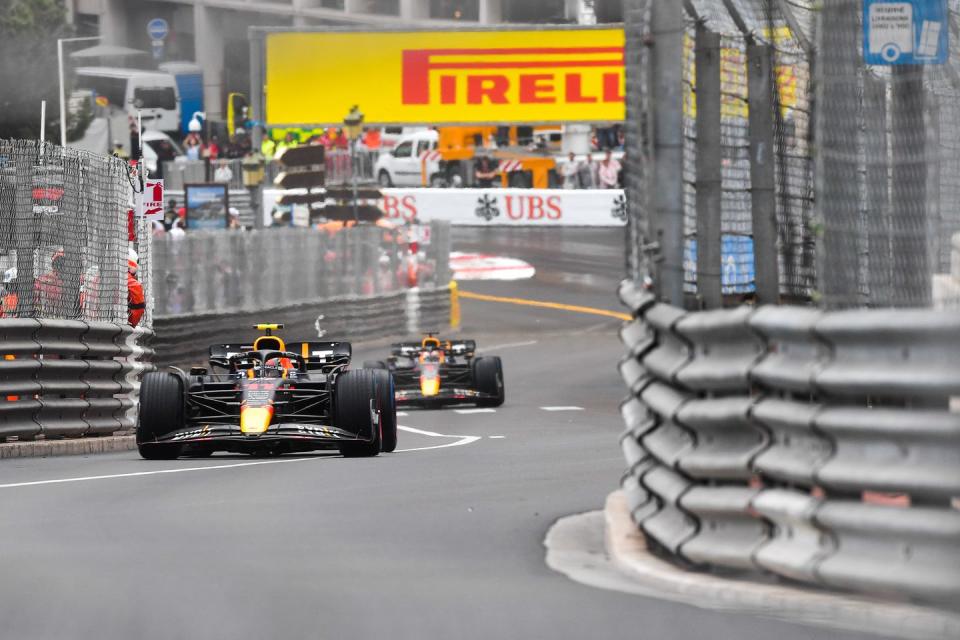
"No one denies that F1 is the top of the motorsport pyramid, at least globally. Maybe if you're from the American perspective, it might be slightly different. So more people watching Formula 1 is good for Formula E, it's good for other open-wheel series.
"We're competitors, no doubt, but equally, we can all coexist for a very long time. We feel very good about where we are because we've got our exclusive license. Our challenge is can we create a racing series that has its own points of differentiation and stands out vis-à-vis what else is out there.
"But it needs an example right? We go to Monaco, we raced on the Monaco track. You know no one talks about how, what the lap time comparisons are between F1 and FE around Monaco. But what they see is that we put on a great racing spectacle. We had 65 passes. 65 overtakes, six lead changes last year in Monaco. That's unheard of in Formula 1.
"It's like playing golf at Augusta. We're all on that big stage, but we just show a different kind of motorsport, and that's why I think we can all kind of coexist for a long time."

 Yahoo Autos
Yahoo Autos 